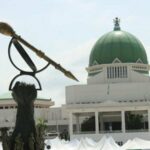
Key players in the aviation industry are dissatisfied with the Federal Government’s decision to exclude the Nigerian Air Force from the procurement of airport surveillance equipment.
The Minister of Aviation, Hadi Sirka, announced on his Twitter that the government had procured one out of nine primary radar equipment, aimed at enhancing the safety, security, and efficiency of the country’s aviation industry.
Sirika also emphasised that the procurement of the new radar equipment was in line with the President, Maj. Gen. Muhammadu Buhari’s (retd) vision for the aviation sector, which had been focused on ensuring the safety, security, and efficiency of air travel since 2015.
However, the CEO of Centurion Security, Group Capt. John Ojikutu, in a chat with our correspondent in Abuja, raised concerns over the procurement of airspace surveillance radar by the government.
Ojikutu stated that it was curious that the Ministry of Aviation purchased the airspace surveillance radar without involving the Nigeria Air Force.
According to Ojikutu, the surveillance of airspace is a joint operation between the Civil Air Traffic Control System and the air force and the procurement of airspace surveillance radar should be a coordinated effort between the two agencies.
He also expressed concern that the procurement was taking place at a time when the government was already burdened with significant amounts of local and foreign debt.
He warned that the country may end up turning to the countries of its creditors to purchase the surveillance radars.
He said,” It is curious that the minister is buying airspace surveillance radar without the inclusion or knowledge of the Nigeria Airforce. No country does that. Airspace surveillance is a joint operation between the civil ATCS and the Air Force.
“It is also worrisome that it is the minister that is doing all the buying and not the responsible agency, NAMA, especially in coordination with the NAF.”
Meanwhile, the CEO of Top Brass Aviation, Capt Roland Iyayi, revealed that the country’s aviation ministry was performing the duties assigned to it in 2006 with the Total Radar Coverage of Nigeria project.
Capt Iyayi said, “As far as I am concerned, what he is saying basically is that what Nigeria was assigned to do in 2006 with TRACON is what we are now doing in 2023. Essentially in 2006, the TRACON project included four primary radars, but this was removed by some government officials and NAMA was left with the secondary radars.
“When I became MD of NAMA, I insisted that the original configuration of primary radars be reinstated and invariably that was not done but as it is now, I am not sure what has happened. I am not sure whether we had to renegotiate afresh the primary radars, which we had paid for in 2006.
“So, if we are installing primary radars now, it is something that was meant to happen in 2006. I believe there is nothing major about this.”
According to him, the entire world is moving away from radars to multilateralism which is a newer technology and more cost-effective.
“The same minister has decided to use the technology in the Niger Delta, where you have a lot of helicopters. I expect that this particular technology, which has been proven in the Western world, to be expanded to cover the entire country,” he explained.
Speaking further noted that it was a good development but coming late, adding that the government should be more serious when it comes to procurement.
In the meantime, the Assistant Secretary General of the Aviation Round-Table, Olumide Ohunayo, lauded the efforts of the government in securing the airspace of the country.
Ohunayo said that having secure airspace was crucial, and the equipment that was designed to detect aircraft in the airspace is commendable.
He added that the remaining equipment should be supplied as quickly as possible to ensure that the country’s airspace is well secured in the face of the current security challenges.





